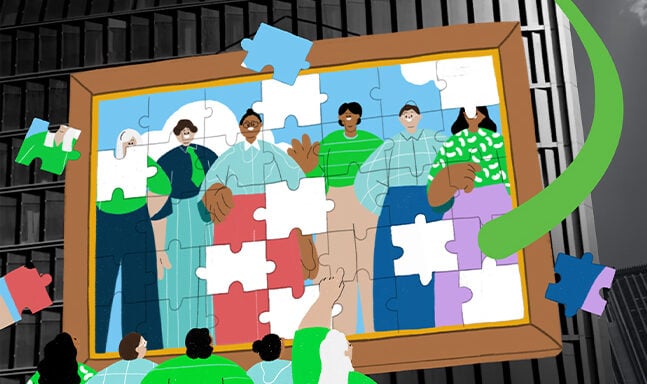From quiet hiring to the Great Resignation: What does the future of talent management hold?
Talent management is the number one top priority for HR leaders today – but what will it look like tomorrow? Here’s what we found.

First the ‘Great Resignation’, then ‘quiet quitting’, followed by now ‘quiet hiring’.
Yes they’re buzzwords, but is this indicative of how much is changing in the workplace today when it comes to talent management and mobility?
With so many factors at play, it’s hard for HR leaders to stay on top of what’s happening. No wonder they’re both excited (over 90%) and worried (66%) about the future.
Talent management was also ranked by HR and business leaders as their number one priority right now, our recent research found.
So what do HR leaders need to know to understand what’s happening right now?
Here’s what we cover in this article:
- Talent management today: Changing employee-employer expectations
- The future of talent management: Is the Great Rebalance coming?
- Navigating the future of talent management with HR tech
Talent management today: Changing employee-employer expectations
First, the Great Resignation
As we saw with the Great Resignation, where record numbers of people left their jobs due to the pandemic, employee expectations of their workplaces have evolved – and continue to do so.
The pandemic shifted employees’ expectations practically overnight. Many were no longer expected to come into the office and companies had to prioritise wellbeing above everything else.
Now, since we’ve emerged from the pandemic, employees have reassessed what they want from their workplaces and they’re leaving in search of a better work-life balance, competitive pay and more job satisfaction.
While talk of the Great Resignation may be slowing, employee expectations of their employers continue to evolve.
Then, quiet quitting
Quiet quitting is another buzzword that’s been bandied around of late but it’s not something new.
Employees the world over have actively withdrawn from their work at various moments in time, choosing to just do the bare minimum and not go over their contractual hours.
From an HR perspective, we don’t think quiet quitting should be viewed as good or bad – more that it’s something that is likely to happen from time to time and it’s important to have greater awareness of it.
In fact, we believe it’s an opportunity to engage more with employees.
It’s a chance to find out what is going on for the individual employee, and teams, and to see if there are ways the business and the manager can better support that person further.
Now, quiet hiring
Quiet hiring has been the latest buzzword to make the headlines.
It’s a new name for an old tactic, effectively shuffling employees around departments or projects to fill the gaps within an organisation rather than hiring new people.
And it’s a reflection of the current economic climate we’re in.
In fact, 8 in 10 employees say they’ve been ‘quiet hired’, a recent survey found.
Tighter operating costs and decreasing profit margins mean businesses have to be smarter about tapping into their internal resources, particularly where organisations are experiencing hiring freezes to save on costs.
While this internal movement might signify the current economic climate we’re currently in, helping employees to build up skills in other departments or areas or utilise skills they already have is definitely of benefit to those who want to develop.
However, stress and burnout is already rife among employees.
In fact, 52% of all workers are feeling burned out today, up 9% since the global pandemic. Organisations must be careful that employees don’t take too much on.
A buzzword is just a buzzword
There’s so much change and uncertainty happening right now.
With that, buzzwords such as the Great Resignation, quiet quitting and quiet hiring are coming to the fore to help us to understand what’s happening in the world of work today and the gap that seems to be widening between employees’ and employers’ expectations.
However, a buzzword is just that – they attempt to sum up some of the change we’re experiencing.
But the workplace today is much more complex than ever before and there are many more changes happening which can’t be summed up in a few words.
The future of talent management: Is the Great Rebalance coming?
Callum Borchers of the Wall Street Journal says: “This may be the year when employer-employee power dynamics begin to normalise.”
Right now, 93% of HR and the C-suite are worried about current economic uncertainty, high inflation levels and a rise in the cost of living, both employers and employees are feeling the pinch.
Job-hopping and fewer counter-offers are likely as the demand for talent and the supply of candidates starts to even out in what is being called the Great Rebalance (also known as the Great Rebalancing).
However, not everyone agrees that the balance is coming quite yet.
There’s still a lot in flux in the world of work after the global pandemic and big shifts continue to happen, such as the four-day working week and the rise of artificial intelligence (AI) adoption, which could lead the gap to widen further.
Hybrid work is an example of this where it’s, arguably, still a work in progress.
Denise Rosseau, Professor of Organisational Behaviour and Public Policy at Carnegie Mellon University, explains: “If people are told different things at different times, without influence over that decision, it’s disturbing.
“The yo-yoing back and forth breeds uncertainty, and people don’t like that there are just so many unknowns.”
For HR, it’s an opportunity to reassess what employees need from their workplaces.
However, organisations will have to do more with less.
With budgets being frozen or cut in many organisations as finance try to balance the books, HR will need to think out of the box about how they can evolve their talent management strategy to bridge the gap between employee expectations and business needs in this challenging market.
We did some research to find out what the future of talent management could hold, so you can start to get ahead today.
1. Goodbye to the term employee experiences and hello ‘people sustainability’
We know employee experiences are vital for productivity and 83% of HR leaders say that they’ll be focusing more on experiences in the future as a result, but should people sustainability be front of mind instead?
US consulting firm Mercer describes people sustainability as: “Treating people responsibly, taking care of people’s physical and mental well-being and valuing talent for their contribution.”
Josh Bersin, CEO of the Josh Bersin company, believes focusing on people sustainability over everything else is the future.
He explains in his trends blog: “Traditional areas like DEI [diversity, equity and inclusion], benefits, health and safety, or employee experience, cluster together around the concept of ‘people sustainability’.”
Josh goes on to say: “There is a never-ending stream of good ideas to promote fairness, equity, belonging, and wellbeing at work, but we need to think about all these programmes as long-term investments and wrap them all up together into ‘long-term sustainability’.”
People sustainability is particularly important during times of economic uncertainty when budget cuts and freezes are happening.
Why?
Because the aspects that make up people sustainability drive engagement and productivity.
We’re in difficult times but these programmes are not just about doing the right thing, they’re also what make employees feel like they belong.
Honing in on that will be key over the next few years.
2. Skills not jobs
The future of recruitment and talent management will focus not on jobs to do, but skills needed instead.
With today’s competitive talent environment, more companies will be looking for candidates with the skills needed, even if they don’t have the direct experience.
Becky Schnauffer, global head of strategic clients at LinkedIn Talent Solutions, explains: “Businesses up and down the country are facing skills gaps, making it harder to capitalise on growth opportunities and overcome uncertainty in the year ahead.”
87% of companies said they were experiencing a skills gap according to McKinsey Research and the World Economic Forum warned that over 50% of employees around the world will need to reskill or upskill by 2025 to stay competitive.
Despite the cost of training, upskilling and reskilling can be more cost-effective alternatives to recruiting.
Research by Gallup found the cost of replacing an employee is between one-half to two times their annual salary.
Meanwhile, the World Economic Forum estimated that to reskill employees can average around $24,000 per employee.
Moreover, your people will thank you for it.
Katy Tynan, Analyst at Forrester Research says: “You’re losing talent when you only see people through the lens of the job they’re hired into.”
Employees are looking for opportunities to learn and develop new skills, and if they don’t get them, they will leave. Up to 20 million UK professionals are considering switching jobs this year alone, according to recent LinkedIn research.
3. A powerful multigenerational workforce
89% of talent professionals believe a multigenerational workforce relates to the success of a business.
We know diversity is good for business and age-based diversity is just one of those, so have you started to consider Generation Alpha?
Generation Alpha is the next generation to be introduced into the workforce.
Named because Alpha is the first letter of the Greek alphabet, this generation who were born from 2010 onwards will be the first age demographic born entirely within the 21st century.
It might seem like a long time until someone from Generation Alpha starts at your organisation, but if you’re a company that supports apprenticeships and those early in their careers, you could be seeing job applications fly in from this generation from 2026 onwards.
So what can you expect from Generation Alpha? According to Dan Schawbel, Managing Partner of Workplace Intelligence, they’ll be “prepared to thrive in our tech-enabled workplace”.
Dan adds: “Alpha’s have access to more tools, resources and people at an earlier age than any other generation.”
Organisations will need to consider what this means for existing generations in the workplace.
Dan explains: “This accessibility gives them a massive competitive advantage as they age but has a side effect of further expanding the generational digital divide.”
To get ahead, organisations need to think about how they continually bring generations currently in the workforce up to date with latest technologies, so they’re not at a disadvantage.
However, getting your organisation up to speed for Generation Alpha will go further than just the technology, including ways of working and the types of companies they’d likely apply for, so there is much more to consider.
4. Overhaul performance management
Right now, over three-quarters (76%) of companies don’t use automated data collection and analysis around performance our research revealed.
And 74% don’t give continuous feedback or provide competency assessments against key job skills.
Performance management is key if you want to help your employees upskill and develop, and plays a crucial part in managing talent effectively.
But performance management processes are often not fit for purpose.
Perry Timms, Chief Energy Officer at People and Transformational HR, explains in an interview on performance management: “If we’re trying to navigate a complicated world, and how well we’re doing in terms of our performance and capability in that world why would this episodic thing, a done to process mean anything to anybody?”
So, what lies in store for the future?
The annual appraisal will be dead and in its place are continuous conversations. In fact, 82% of HR leaders agree.
83% of HR leaders say goals will be fairer in future, more objective, and even more personal and professional.
“Performance management should be about people having a real sense of how they’re doing, where they’re going, what they could be doing more of, and an exchange that means something to them and the person who has a duty of care for them,” says Perry.
One thing HR leaders can do now to be prepared for the future is to get the right technology in place.
Nearly all (95%) of HR leaders say technology is needed for successful performance management, but 43% of HR leaders don’t rate their performance management software as very good.
Looking for an HR technology suite with performance management as part of that will be vital to successfully move to a continuous conversations format for performance, so don’t leave it until the last minute – start now.
Navigating the future of talent management with HR tech
Ultimately, many HR leaders get into the sector because they want to make a difference.
And managing talent is where HR can make the most impact – to support their people and play their role in building brilliant and resilient workforces.
In fact, 57% of HR leaders told us they love what they do.
While we don’t know what the future holds for certain, we know HR leaders are overworked and overstretched more so than ever right now with all the challenges and uncertainty HR teams and their organisations are dealing with.
Nearly all (95%) of HR leaders we polled said that HR is simply too much work right now.
Relying on HR tech can help HR leaders to lighten the load and swap the time they spend on processes and paperwork to use on their people strategy instead – and bridge the employee-employer expectations gap once and for all.
By reducing the admin through HR automation, HR leaders can dedicate more time to their people strategy instead – and that’s what truly matters.
Discover more about HR automation and how to use technology to automate core HR processes – so you can scrap the paperwork and focus on your people.







Ask the author a question or share your advice